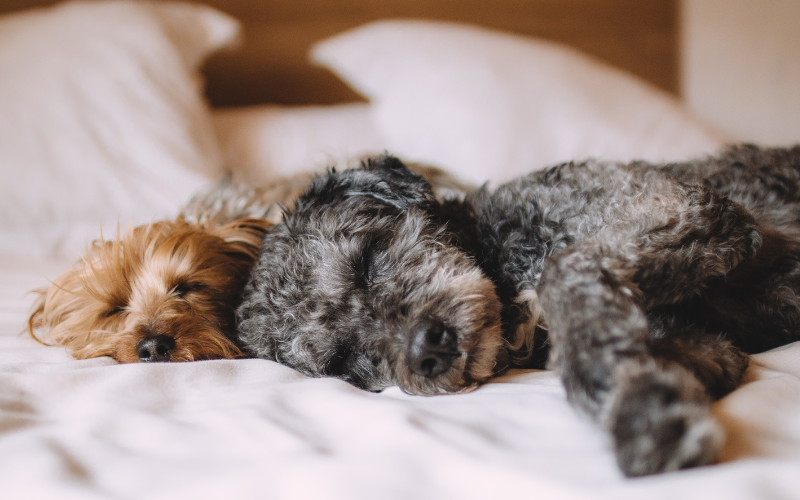There are few things more smile-inducing and “awww”-inspiring than watching how dogs sleep, sprawled out and snoozing away. But dogs don’t just sleep because it’s adorable. Just like in people, sleep for dogs is a critical aspect of their health.
When you start thinking about a dog dozing off, it raises a handful of questions: how is dog sleep like human sleep? How much do dogs need to sleep? Can they sleep too much? And do they dream like we do?
This guide helps answer these questions and more so that you can better understand your dog’s sleep and promote the sleep that they need to continue being a healthy and happy part of your family.

How Much Do Dogs Sleep?
If you have owned a dog, you’ve probably noticed that sleeping is one of their best abilities. Whether it’s safely sprawled out in the shade on a hot day or curled up at the foot of your bed at night, you’ve seen how a dog can get comfortable and doze off in all sorts of places and at all times of day. But you may not have ever tallied or noticed exactly how much your dog slept in total through the day, especially if you spend part of your day at work or otherwise away from home.
It turns out that dogs need a lot of sleep. In general, dogs spend about half of the day or a little bit more, ranging from 12-14 hours, asleep. However, several factors affect exactly how much a dog is likely to sleep on an average day:
- Age: puppies and older dogs both spend more time asleep than dogs that are in middle age. To support their growth, puppies may spend up to 20 hours asleep. And senior dogs naturally have a lower energy level and get exhausted more easily, requiring more sleep on a daily basis.
- Breed and Size: though not universally true, bigger dogs will sleep for more hours per day than smaller dogs. Larger breeds of dogs tend to need more sleep and can sometimes sleep up to 18 hours a day even in middle age.
- Activity: it may seem counterintuitive, but dogs that are very active, especially working dogs, usually need less sleep than dogs that are less active and are sedentary for most of the day.
Too Much Sleep?
It’s clear that dogs log a lot of time snoozing, and that’s totally normal. But some dog owners may worry that their dog is sleeping too much. It can be hard to know when your dog’s sleep crosses a line from normal to too much, but here are some signs to watch out for:
- Excessive lethargy: if your dog is sleeping more than normal and also seems to lack energy even during the hours when it’s awake, this may be a sign of a bigger issue.
- Breathing problems: if it seems as though your dog is having issues breathing when sleeping, such as apneas (brief lapses in breathing) for smaller, short-snouted dogs, that may be an indication of a larger concern.
- Accompanies other changes: what seems like increased or excessive sleeping may be more worrying if it happens at the same time as other changes in your pet’s daily habits or health. For example, if you notice that your dog’s appetite or bowel habits have changed at the same time as their sleeping habits, it can be a sign of a potential problem.
- If excessive sleepiness is persistent: just as in people, it’s not uncommon for a dog to have some variance in how much it sleeps on any given day. But if it seems to be persistent and ongoing that your dog is sleeping more than normal, it may be something to bring up with a vet.
If your dog’s sleeping habits have changed — by sleeping more or less — it is important to raise your concerns with a vet. A vet can help review what’s normal and conduct any tests that might be needed to determine if your dog has any pressing health issues.
If it is determined that a dog is sleeping more than is normal, there are many potential causes.
- Change to routine: if you’ve recently moved or changed your work hours and daily schedule, this can affect a dog’s sleep patterns since dogs prefer regular routines.
- Depression: like humans, dogs can become depressed, and this can lead to lethargy and withdrawal.
- Lack of food or water: if your dog isn’t getting the proper amount of hydration or nutrition, it can affect energy levels.
- Hypothyroidism: in this condition, your dog is not getting enough of a hormone made by the thyroid gland. This can happen with all breeds of dogs and can lead to sluggishness. It is usually accompanied by other symptoms.
- Other health problems: excessive sleepiness in dogs can also be related to other issues like Lyme disease, diabetes, parvovirus, and many other conditions.
The Science of Canine Sleep
You may have looked at a sleeping dog and sighed in response to such cuteness, but you may have also wondered about what’s really going on in your dog’s brain and body when snoozing so peacefully. In many ways, the science of canine sleep is similar to the science of human sleep. We’re both mammals, and even though the human brain is obviously more advanced, there is considerable overlap with regard to the physiology of sleep.
Stages of Canine Sleep
Research has identified that the brain waves of dogs during sleep are reminiscent of those of humans. Like people, dogs go through different stages of sleep including short-wave sleep (SWS) and deep sleep (often referred to as rapid-eye movement, or REM, sleep). SWS is the period after first falling asleep as the mind and body start to relax. In REM sleep, though, there is more brain activity, and though researchers still don’t fully understand all of the ins-and-outs of deep sleep even in people, this sleep is thought to play a major role in getting the full amount of needed rest and recovery.
In humans, the sleep cycle — going from SWS to REM — is long and drawn out. In dogs, though, this cycle takes place much more rapidly. Though it can depend on the breed, some dogs can enter REM sleep in under 20 minutes. It’s normally pretty clear that your dog has entered REM sleep because this is when you will observe involuntary eye or muscle twitching. Some dogs also make noises, like whimpers or quiet barks, when they are in a deep sleep part of their sleep cycle.
Length of Sleep Cycles
The fact that your dog enters deep sleep much more quickly also means that its overall sleep cycle is much shorter. As a result, dogs don’t need the kind of long blocks of uninterrupted slumber that humans do. While fragmented sleep can be a major cause of drowsiness in people, it’s not really an issue for your canine family member. They can accumulate the sleep that they need in smaller chunks throughout the day.
Another consequence of the shorter sleep cycle for dogs is that they are generally more easily awoken. Dogs are more easily awoken during short-wave sleep, but even during deep sleep, it’s not uncommon for a dog to wake up at light sounds. This may be even more common in certain breeds that have historically been guard dogs or protectors.
Should I Wake My Dog Up?
Some experts advise against waking a dog that’s in deep sleep whenever it can be avoided. While this is a good policy — after all, let sleeping dogs lie — know that the consequences of disrupted sleep for a dog are not the same as for people. Even if a dog wakes up in the middle of a sleep cycle, they can usually just recoup that lost time with sleep later on in the day.
Advertise With Us
Get exposure for your products and services by partnering with MyDogBlog.
Banner Ad & Blog
Adult Dog PackageContribute to the ongoing educational efforts of MyDogBlog. Sponsor a featured article regarding all things dog related, from health tips to useful tools to train your pup. We are HUGE advocates for animals rights. Your ads will help support costs to push for stricter laws.
Original Article | Sleep Health Institute





